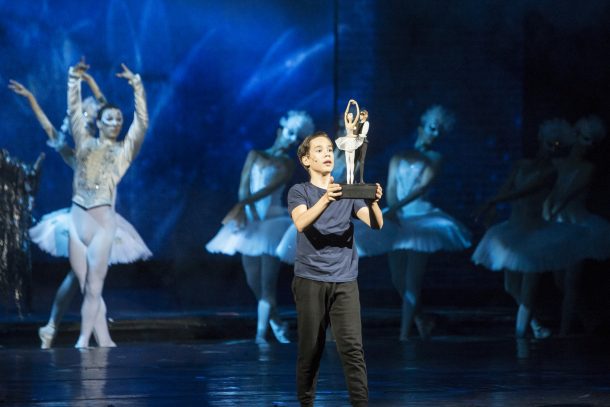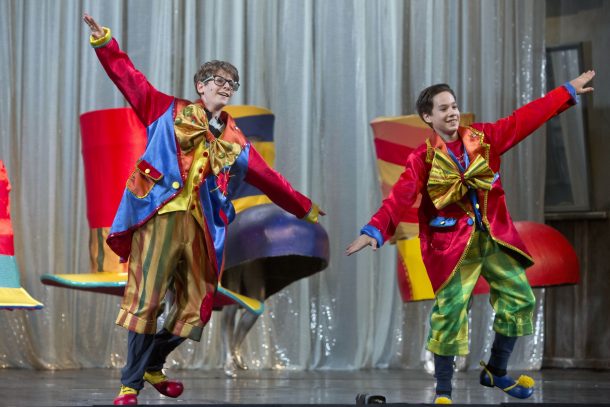When the conservative Fidesz party assumed power in 2010, Hungarian LGBTQ citizens had legitimate reasons for concern. Prime Minister Viktor Orbán rode to victory on a platform that promised a better future for Hungary with a renewed focus on “work, home, family, health, and order.” Within two years Orbán’s government enacted a new constitution, which does not protect individuals from discrimination based on sexual orientation and restricts marriage for heterosexual couples only. Robert Alföldi – the director of the National Theatre of Budapest – was one of the first casualties of this legalized homophobia. As Nick Cohen explained in a contemporary piece for The Guardian, Alföldi was ousted in 2013 amid protests from right-wing extremist members of the Hungarian Parliament who claimed Alföldi to be “a fag, a pervert, and a Jew,” and, consequently, unfit for the directorship. (Marvin Carlson writes extensively about the disconcerting situation in “Troubling Cross-Currents in the Budapest National Theatre,” European Stages, vol. 5.) Additionally, István Tarlós, who became the mayor of Budapest with the support of Fidesz in 2010, has exhibited similar disdain for the LGBTQ community and has (unsuccessfully) tried several times to cancel Budapest’s annual Pride Parade. In 2015, Tarlós told a morning talk show host that the parade “is not natural…is repulsive,” and “is unworthy of the historical environment of Andrássy út,” which is both the Pride Parade route and Budapest’s wealthiest thoroughfare.
It is somewhat surprising then that within Hungary’s current political and social climate, one of the most ballyhooed productions in 2016 was Billy Elliot the Musical – Sir Elton John and Lee Hall’s film-to-stage adaptation that premiered in London in 2005 only to inspire numerous subsequent productions around the world. Telling the story of a boy living in a Northeastern mining town in Thatcher-era UK who dreams of becoming a ballet dancer amidst a labor strike, Billy Elliot is unabashedly one of the queerest musicals of the 21st century. The show celebrates unconventional gender roles and sexual identities, and the central message is summed up in “Expressing Yourself,” a duet performed (in drag) by Billy and his cross-dressing, gay best friend Michael. As they proclaim in song, “Everyone is different,/ It’s a natural state,/ It’s a fact,/ It’s plain to see./ The world’s gray enough without making it worse,/ What we need is individuality.” The theme is emphasized in the show’s final curtain call in which the entire cast — men, women, and children — dons frilly tutus and tap shoes, and reprises the song.
The Hungarian language production (translated by István Puller and Ferenc Bárány with English supertitles) boasted a new, “non-replica” staging of the musical by Tamás Szirtes with choreography by Ákos Tihanyi. The show was originally set to open at Budapest’s largest theatre, the Erkel, but it opened instead at the Hungarian State Opera on 29th July, 2016. Thus, Billy Elliot has the distinction of being the first musical to be performed in this venue which is a crown jewel of a theatre centrally located in — to use Mayor Tarlós’s expression — “the historical environment” of Andrássy út. By reducing ticket prices and establishing earlier start times, the producers hoped to appeal to families and people who would not normally attend a performance at the Opera House. “We believe,” they explained in the promotional material for the show, “that music and dance are for everyone, and that includes ballet.”
This was a terrific, if rather politically jarring, production of Billy Elliot. The performances on 16th August 2016 were, indeed, among the best I have seen of the play. And, in all honesty, I am no stranger to Billy Elliot on account of having seen the original, Stephen Daldry-directed production a handful of times in London and New York. While typically only the roles of the children are doubly or triply cast, in this version, all the principal roles, including those of the adult actors and the featured dance soloists, had several alternatives. The lead I saw – John Baily McAllister – who is credited as the “opening-night” Billy, was generally effective in terms of representing the confusion and anger of being a kid in a society where he struggles to find his place. McAllister’s strength as a dancer clearly lies in tap and gymnastics, and he excelled in the musical comedy numbers and the “Angry Dance” which encapsulates Billy’s rage at the familial, economic, and political conditions that nearly suffocate him. McAllister’s limited leg extensions and wobbly balance, however, undercut the sheer beauty and thrill of watching the young Billy in the choreographed ballet reveries where he performs a modified version of Swan Lake with members of the State Opera’s ballet corps, and later, partners with a soloist who represents his older, more accomplished self (performed exquisitely by German Borsai). In general, Tihanyi’s choreography, which, except for the bolstered ballet sequences, did not depart radically from Peter Darling’s original in style and tone, was suitably well served by the company.

John Bailey McAllister and Company, Billy Elliot the Musical by Sir Elton John and Lee Hall, directed by Tamás Szirtes at the Hungarian State Opera, 2016. Photo: Pályi Zsófia.
Judit Ladinek as Mrs Wilkinson, the embittered dance teacher who stirs Billy’s drive and talent, offered a rich and layered portrayal of a woman who has numbed herself to the aesthetic and social dreariness of her community. She got the requisite laughs with her withering put-downs directed toward the children and her laissez-faire flicks of her cigarette while teaching her bumbling young dance students how to “give ‘em the old razzle dazzle” and “turn on the ol’ pizazz.” Ladinek, however, brought to the role a noticeable excellence in dance techniques, as well as a sense of youth that has diminished too soon. Her performance begged the question – what might Mrs Wilkinson have become if she had a mentor in the manner she herself was for Billy, by pushing him to pursue his dreams and eschew the conventional, dead-end life of a mining town?
Another standout was Sándor Tóth in the role of Apa (Dad). A large, muscular man with a perpetual scowl, Tóth physically and emotionally epitomized the effects of class oppression as well as his life’s bitter circumstances, which made the character a young widower and required him to be both a mother and a father to two teenaged boys. Yet, the moment in which Apa understands what to him initially appeared as the completely foreign aspirations harbored by his son in the way of becoming a ballet dancer, is among the most heart-wrenching in musical theatre. And Tóth carried it off movingly. The character’s catharsis metaphorically embodies every queer kid’s fantasy where out of his love for and acceptance of his son, the father sacrifices both his sacrosanct solidarity with his fellow coalminers and his unquestioned masculinity, and subsequently, suffers a fish-out-of-water sort of mortification by accompanying Billy to the posh, rarified world of the Royal Ballet. Furthermore, the entire community eventually rallies around Billy, whose victory is juxtaposed with the failure of the strike. And in the end, Billy’s difference is not simply tolerated but embraced and encouraged.
While there was so much that was good about this production, including István Szlávik’s and János Szücsborus’s scenic design and smart use of projections to convey the exterior realities as well as the characters’ interior fantasies, it was quite disturbing that so many of the directorial choices worked against the recurring refrain of individuality and acceptance. For instance, my heart sank with the interpolation of some familiar gay stereotypes. Mr Braithwaite, Mrs Wilkinson’s assistant, was played here as a flamboyant, flighty, and not-so-closeted homosexual. In an easy attempt for laughs, when Mr Braithwaite (played by Bálint Ekanem) joined Billy and Mrs Wilkinson in “Born to Boogie,” he was all limp wrists and high-pitched screeches. He seemed to be channeling the Village People – the 1970s gay-identified disco group – via the flaming exercise guru Richard Simmons. Also, when Billy went in for his Royal Ballet dance audition leaving his father uncomfortably alone onstage, a male ballet dancer wearing white tights and a silver-and-white jacket joined him. The visual was meant to be both absurd and comedic as the two men representing polar opposites in dress, social class, age, physical appearance, and deportment stood side by side. In the performance I saw, however, the humor was pushed to homophobic limits as Billy’s father (who was a formidable presence just a few scenes earlier) cowered in front of the dancer who, signifying a gay predator, mimed sexual advances and took seductive drags from a cigarette.
The duet with Michael and Billy is intended to be a joyful paean to male-to-female cross-dressing and reflect the playfulness associated with gender expressions. In the original production, Billy encountered Michael wearing a full ensemble, from head-to-toe, of clothing and accessories purloined from his sister’s closet. (Michael’s transformation is usually so complete that during one of the times I saw a production of the play in New York, my mother, who is over 80 and hard-of-hearing, asked during intermission, “Who was that little girl who danced with Billy?”) During the song, the boys put on an array of women’s clothes (including Michael’s mother’s wedding dress), and the dance break concludes with the boys in full women’s drag and backed by a chorus of oversized dresses and frocks. In the Hungarian version, Billy encountered a non-committal trans Michael wearing a simple sundress over his boys’ clothing. While singing and dancing, the two boys momentarily put on and took off girls’ dresses, but the bulk of the number had the pair dancing with Fosse-style bowler hats and canes. The big finish presented Billy and Michael in brightly colored, baggy circus clothes, and they danced with a chorus of larger-than-life clown accouterment. The confusing point seemed to be that rather than expressing one’s gender through dress, individuals should experiment with clothes to convey their inner fragmented identities.

Zalán Kamarás and John Bailey McAllister, Billy Elliot the Musical by Sir Elton John and Lee Hall, directed by Tamás Szirtes at the Hungarian State Opera, 2016. Photo: Péter Rákossy.
Also, particularly upsetting was the tweaked ending for this production. The original concludes with Billy, alone on stage leaving for London. Just as he is exiting through the proscenium toward the front of the house, Michael rides in on his bicycle and calls out, “Hey, dancing boy!” and Billy returns for a final goodbye. In a bittersweet act of friendship and understanding Billy kisses Michael on the cheek before moving toward his unknown, but bright future with Michael left alone on the stage. Lamentably, Szirtes and his adapters removed the final kiss, and the two boys said goodbye with a high-five that morphed into an amicable hug. By excising the kiss was the creative team bowing to political pressure? Were we to assume that the kiss on the cheek might be interpreted as a salacious sexual act between the two boys? Or, might one construe it as a defiantly pro-gay statement, and, therefore, dangerously seditious? Regrettably, these were the questions that irked me even as I watched the dazzling finale with the tutu-adorned company tapping away in joyous abandon.
Prime Minster Orbán has denied that Hungary is turning toward outright homophobia. He has publicly stated that his country’s attitude toward homosexuality is based on “tolerance” and “patience” even as he upholds the severe lack of constitutional rights accorded to the Hungarian LGBTQ community. He has also said that he is “grateful to the Hungarian homosexual community for not exhibiting the provocative behavior against which numerous European nations are struggling and which results in an outcome that is the exact opposite of what they want to achieve.” Billy Elliot, nevertheless, is a musical about full acceptance — and not mere patient tolerance — of difference, and this rally cry is for an unapologetic expression of one’s identity — no matter how provocative that may be. Unfortunately, this liberatory call-to-arms in the Hungarian production of Billy Elliot the Musical carried a decidedly mixed message, and the performance reflected the subtle but palpable ways cultural politics can alter, undermine, and infect works of art.
James F. Wilson is a Professor of English and Theater at LaGuardia Community College and the Graduate Center of the City University of New York. His areas of research include queer theatre and performance, African American theatre and pedagogy. He is the author of Bulldaggers, Pansies, and Chocolate Babies: Performance, Race, and Sexuality in the Harlem Renaissance (2010).
European Stages, vol. 8, no. 1 (Fall 2016)
Editorial Board:
Marvin Carlson, Senior Editor, Founder
Krystyna Illakowicz, Co-Editor
Dominika Laster, Co-Editor
Kalina Stefanova, Co-Editor
Editorial Staff:
Cory Tamler, Managing Editor
Mayurakshi Sen, Editorial Assistant
Advisory Board:
Joshua Abrams
Christopher Balme
Maria Delgado
Allen Kuharsky
Bryce Lease
Jennifer Parker-Starbuck
Magda Romańska
Laurence Senelick
Daniele Vianello
Phyllis Zatlin
Table of Contents:
- The 70th Avignon Festival: An Experiment In Living Together by Philippa Wehle
- The 2016 Berlin Theatertreffen: Is Half a Festival Better Than None? by Marvin Carlson
- Introduction au Kunstenfestivaldesarts de Bruxelles 2016 by Manuel García Martínez
- The Fidena Festival, 2016 by Roy Kift
- The Noorderzon Festival in Groningen by Manuel García Martínez
- Review of The Suicide by Steve Earnest
- Spain: Runaway Hits and Ephemeral Memorabilia by Maria M. Delgado
- The Seagull: An Idea for a Short Story by Emiliia Dementsova
- Billy Elliot The Musical at the Hungarian State Opera by James Wilson
- Chorus of Orphans: A Theatre Séance by Poland’s Teatr KTO, Kraków by Jacob Juntunen
- Theatre More Arresting than Ever: A Conversation with Dorota Masłowska by Krystyna Lipinska Illakowicz
Martin E. Segal Theatre Center:
Frank Hentschker, Executive Director
Marvin Carlson, Director of Publications
Rebecca Sheahan, Managing Director
©2016 by Martin E. Segal Theatre Center
The Graduate Center CUNY Graduate Center
365 Fifth Avenue
New York NY 10016



